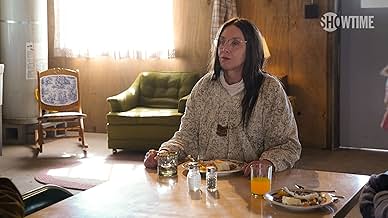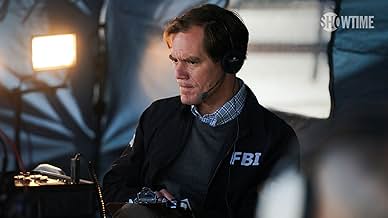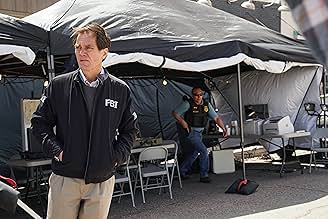Ein Ereignis, das die amerikanische Milizbewegung aufrüttelte und zur Radikalisierung von Timothy McVeigh und Terry Nichols beitrug.Ein Ereignis, das die amerikanische Milizbewegung aufrüttelte und zur Radikalisierung von Timothy McVeigh und Terry Nichols beitrug.Ein Ereignis, das die amerikanische Milizbewegung aufrüttelte und zur Radikalisierung von Timothy McVeigh und Terry Nichols beitrug.
Folgen durchsuchen
Handlung
WUSSTEST DU SCHON:
- WissenswertesThere were originally six episodes written and filmed, but it was condensed down to five in post-production.
- PatzerTimothy McVeigh is shown driving a yellow Mercury Grand Marquis during the months he was planning the OK City bombing. He did not own that car until April 14, 5 days before the bombing. He was forced to buy it in Kansas when his other car blew a head gasket.
- VerbindungenFollows Waco (2018)
Ausgewählte Rezension
I didn't realize this series was in connection with 2018's mostly forgettable "Waco". I found "Aftermath" much more intriguing.
Serving as both a prequel and sequel to "Waco", it tells parts of the story that are less known and which might raise more difficult (and sadly relevant) questions than the story of the actual raid and stand-off can, at least for anyone who's already familiar with the story. Unfortunately, the creators don't want to get messy enough to fully wrestle with the bigger questions it almost raises.
The strongest part of the series is the courtroom drama conspiracy trial of surviving Koresh followers. Ribisi, a perennially underappreciated actor, offers the most compelling portrayal in the series as the survivors' defense attorney. As a reported scientologist in real life, it's a little ironic that Ribisi's character is at times both defensive and accusatory of his clients regarding their blind devotion to Koresh as a cult leader.
The prequel portion of the series, the Koresh origin story, is pretty hokey. Brief snippets from "Waco" and Taylor Kitsch's portrayal of Koresh (whose performance was one of that series's strengths) only further expose the weaknesses of Keean Johnson's immature performance. And asking the audience to believe that Johnson somehow physically transformed into Kitsch in only a few short years is a pretty big ask.
But Michael Shannon, reprising his role as FBI agent Gary Noesner, is surprisingly one of the weakest links of the series. He seems to be mostly sleepwalking through this one. Maybe his character is tired from all the sleepless nights after his involvement at Waco? Whatever the case, it doesn't really work here and his scenes tend to drag the story down.
As for the McVeigh/Nichols interjections, they're thematically and historically important as far as the fallout of Waco is concerned, but they often feel like afterthoughts instead of aftermath.
The series tries its hardest to humanize everyone involved-perhaps even those who arguably don't deserve to be humanized-in order to show that labeling enemies as "evil" only leads to more violence and destruction. Fair enough. But it's a little too neat to reduce the lessons of Waco to "can't we all just get along?"
Serving as both a prequel and sequel to "Waco", it tells parts of the story that are less known and which might raise more difficult (and sadly relevant) questions than the story of the actual raid and stand-off can, at least for anyone who's already familiar with the story. Unfortunately, the creators don't want to get messy enough to fully wrestle with the bigger questions it almost raises.
The strongest part of the series is the courtroom drama conspiracy trial of surviving Koresh followers. Ribisi, a perennially underappreciated actor, offers the most compelling portrayal in the series as the survivors' defense attorney. As a reported scientologist in real life, it's a little ironic that Ribisi's character is at times both defensive and accusatory of his clients regarding their blind devotion to Koresh as a cult leader.
The prequel portion of the series, the Koresh origin story, is pretty hokey. Brief snippets from "Waco" and Taylor Kitsch's portrayal of Koresh (whose performance was one of that series's strengths) only further expose the weaknesses of Keean Johnson's immature performance. And asking the audience to believe that Johnson somehow physically transformed into Kitsch in only a few short years is a pretty big ask.
But Michael Shannon, reprising his role as FBI agent Gary Noesner, is surprisingly one of the weakest links of the series. He seems to be mostly sleepwalking through this one. Maybe his character is tired from all the sleepless nights after his involvement at Waco? Whatever the case, it doesn't really work here and his scenes tend to drag the story down.
As for the McVeigh/Nichols interjections, they're thematically and historically important as far as the fallout of Waco is concerned, but they often feel like afterthoughts instead of aftermath.
The series tries its hardest to humanize everyone involved-perhaps even those who arguably don't deserve to be humanized-in order to show that labeling enemies as "evil" only leads to more violence and destruction. Fair enough. But it's a little too neat to reduce the lessons of Waco to "can't we all just get along?"
Top-Auswahl
Melde dich zum Bewerten an und greife auf die Watchlist für personalisierte Empfehlungen zu.
- How many seasons does Waco: The Aftermath have?Powered by Alexa
Details
- Erscheinungsdatum
- Herkunftsland
- Offizieller Standort
- Sprache
- Auch bekannt als
- Уэйко: Последствия
- Produktionsfirmen
- Weitere beteiligte Unternehmen bei IMDbPro anzeigen
- Farbe
- Sound-Mix
- Seitenverhältnis
- 2.00 : 1
Zu dieser Seite beitragen
Bearbeitung vorschlagen oder fehlenden Inhalt hinzufügen











































